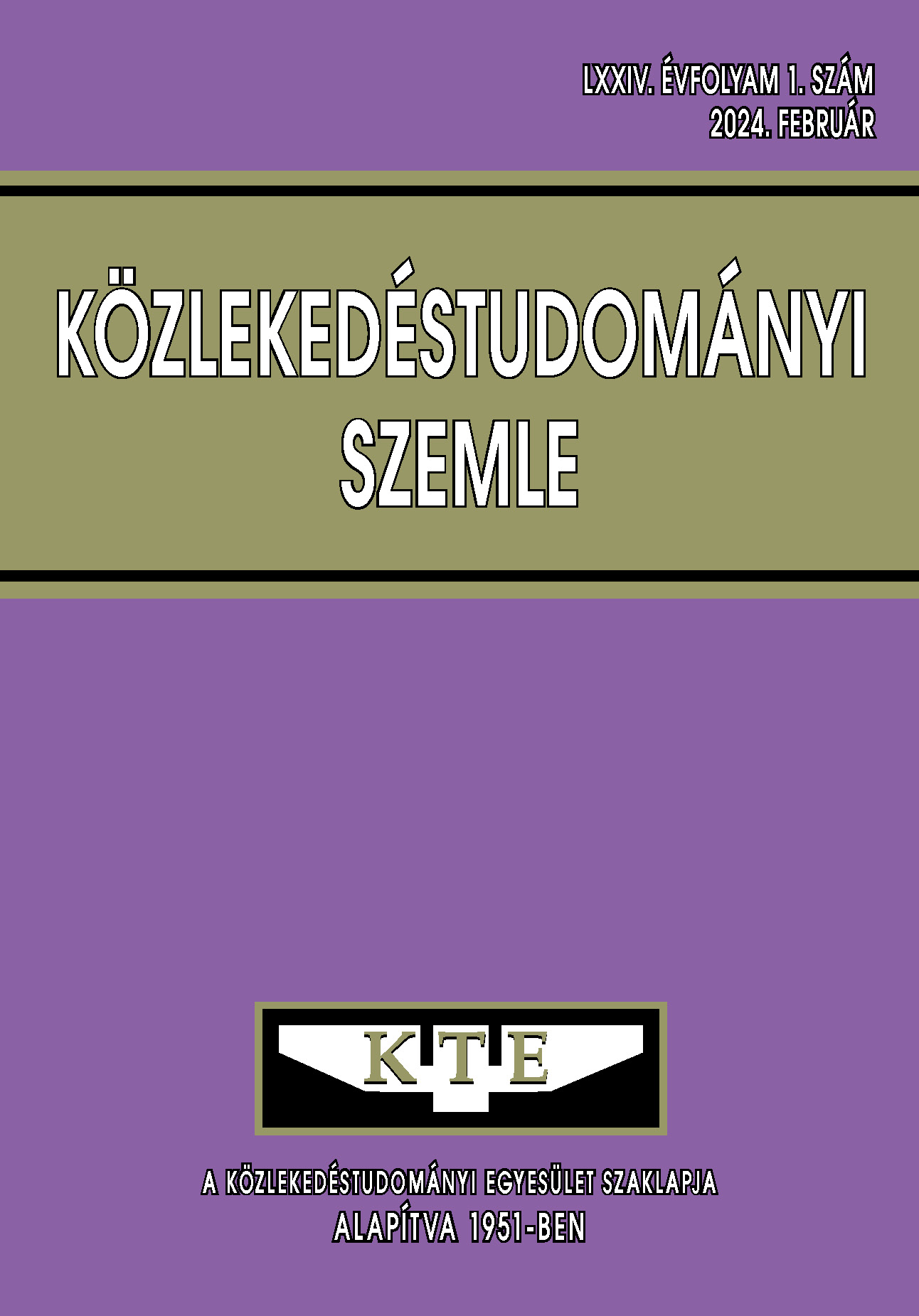Optimális gyorsjárati közlekedési rend kialakítási lehetősége Budakeszi – Budapest között
Absztrakt
A közforgalmú közlekedés vonzerejének növelésére az egyik legjobb lehetőség az utasok eljutási idejének mérséklése, amelynek hatékony módja lehet a járatok gyorsítása bizonyos megállóhelyek kihagyása által. Mivel azonban az így kihagyott megállóhelyek utasai számára hátrányos a szolgáltatás gyakoriságának csökkenése, a közlekedési rend módosítását részletes, számszerű vizsgálatoknak kell megelőzni.
Hivatkozások
Zsámbéki-medence autóbuszos közlekedésének fejlesztése. Javaslati dokumentáció – Bírálati terv, 2022. (megrendelő: BFK Zrt., generál tervező: UVATERV Zrt.); Közösségi közlekedési javaslatok fejezet (BME Közlekedéstechnológiai és Közlekedésgazdasági Tanszék)
Változások Budakeszi közlekedésében. BKK, 2012. május 9. (https://budapest.hu/Lapok/Változások-Budakeszi-közlekedésében.aspx; 2023. szept. 28.)
Vuchic, V.R.: Urban Transit System and Technology. Hoboken, NJ: John Wiley & Sons, 2007. ISBN: 978-0-471-75823-5
Borza V.: Lehet nyereséges a vasúti közszolgáltatás – az integrált ütemes menetrend gazdasági alapjai. Közlekedéstudományi Szemle 2007/10. p. 362-372.
Földiák J. – Kormányos L.: Zónázó struktúrájú menetrendek a Budapest—Esztergom vasútvonalon, a villamosítást követően. VII. Közlekedéstudományi Konferencia, Győr, 2017. ISBN: 978-615-5298-95-0, p. 177-189.
Leiva, C. – Muñoz, J. – Giesen, R. – Larrain, H.: Design of limited-stop services for an urban bus corridor with capacity constraints. Transportation Research, Part B, Methodology 44 (10), 2010.: p. 1186–1201., DOI: https://doi.org/d7dzdn
Ulusoy, Y. Y. – Chien, S. I.-J. – Wei, C.-H.: Optimal All-Stop, Short-Turn, and Express Transit Services under Heterogeneous Demand. Transportation Research Record, 2197 (1), 2010.: p. 8–18., DOI: https://doi.org/dhhmk5
Chiraphadhanakul, V. – Barnhart, C.: Incremental bus service design: combining limited-stop and local bus services. Public Transport 5, 2013.: p. 53–78. DOI: https://doi.org/mbnm
Larrain, H. – Muñoz, J.C. – Giesen, R.: Generation and design heuristics for zonal express services. Transportation Research, Part E: Logistics and Transportation Rev. 79, 2015.: p. 201-212 DOI:
Mei, Y.: Optimal design of skip-stop transit service in a corridor under heterogeneous demand. PhD thesis, The Hong Kong Polytechnic University Department of Electrical Engineering 2019.
Liang, M. – Zhang H. M. – Rui M. – Wang, W. – Dong, C.: Cooperatively coevolutionary optimization design of limited- stop services and operating frequencies for transit networks. Transportation Research, Part C: Emerging Technologies 125, 2021.: p. 103038 DOI: https://doi.org/gn3srq
Fan, W. Ran, Y.: Planning skip-stop services with schedule coordination. Transportation Research, Part E: Logistics and Transportation Rev. 145, 2021.: p. 102119 DOI: https://doi.org/gn3sr2
Nagy E. – Szabó D. (szerk.): Városi közlekedési kézikönyv. Műszaki Könyvkiadó, 1984. ISBN: 963 10 4921 3, p. 107.
Kózel M. – Soltész T.: A menetidő törvényszerűségei eloszlásminták alapján a közösségi közlekedésben. Nemzeti Közlekedési Napok konferencia, 2013. nov. 7.
Hertel, G.; Lehmann, G.; Mittag, M.; Woda, A. (Hrsg.): Verkehrsentwicklung und Verkehrssystemtechnik, EIPOS - Nachschlagewerk, Europäisches Institut für postgraduale Bildung (EIPOS e.V.), Dresden, 1994.
Horváth Balázs: Tömegközlekedési ráterhelési modellek értékelő elemzése és fejlesztése. PhD doktori értekezés. BME Közlekedésüzemi Tanszék 2005.
Az elektronikusan megjelenő cikkek nyílt hozzáféréssel rendelkeznek (OJS), online ingyenesen elérhetők és letölthetők. A cikkek szerzőit nem terheli megjelentetési vagy kiadási költség (APC). Felhasználóknak joguk van a cikkek olvasására, letöltésére, másolására, kinyomtatására, valamint azokban való keresésre, vagy a teljes szöveg linkkel történő megosztására.
A szerzőknek nyilatkozniuk kell arról, hogy beadványukat korábban nem tették közzé más folyóiratban, a pénzügyi támogatás feltüntetésre került és a hivatkozások listája teljes és pontos, beleértve az URL-ek és a DOI-k specifikációját is (ha rendelkezésre állnak). A cikktervezet beadásakor minden szerző jóváhagyja a benyújtott változatot. A szerzők garantálják, hogy a cikk az ő eredeti művük. A szerzők kötelesek részt venni a szakértői értékelés folyamatában, követni a bírálók tanácsait, betartani az előírt határidőket, és amennyiben előfordulnak, kötelesek visszavonni a benyújtást vagy kijavítani a hibákat.
Minden beadott cikket szakértői értékelés alá kerül, ahol a szerkesztők független értékelést kérnek legalább egy szakértőtől, ügyelve arra, hogy a bíráló(k)nak ne legyen összeférhetetlensége a szerzőkkel. A végső döntést a főszerkesztő hozza meg, aki figyelembe veszi az értékeléseket és a szerkesztők javaslatait. A szerkesztők és a lektorok bizalmasan kezelik a beadványt.
A kiadó és a szerkesztők elkötelezettek a magas etikai normák betartása mellett, és megakadályozzák azokat a publikációkat, amelyekben kutatási visszaélés történt. Az ilyen etikai kérdésekben a COPE irányelveit követik.
A szerzők fenntartják a szerzői jogokat, és megadják a folyóiratnak az első közzétételi jogot a Creative Commons Licenc alapján (https://creativecommons.org/licenses/by-nc-nd/4.0), amely lehetővé teszi mások számára, hogy megosszák a művet, elismerve a mű szerzőségét és a folyóiratban való első közzétételt.
A folyóirat archiválja az összes megjelent cikket, és a folyóirat tulajdonosa, a Közlekedéstudományi Egyesület továbbra is üzemelteti az adatbázist abban az esetben is, ha a folyóirat kiadása megszűnik.















